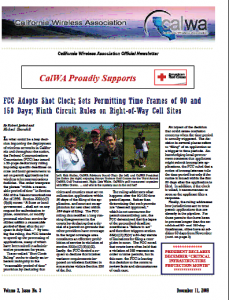 The following is a press release from the Supreme Court of Ohio regarding its decision on December 15, 2009 suppressing data contained from within a cell phone that was seized without a warrant and that data was used against the defendant at trial.
The following is a press release from the Supreme Court of Ohio regarding its decision on December 15, 2009 suppressing data contained from within a cell phone that was seized without a warrant and that data was used against the defendant at trial.
Warrantless Search of Cell Phone Data Barred Unless Necessary for Officer’s Safety or to Preserve Evidence
2008-1781. State v. Smith, Slip Opinion No. 2009-Ohio-6426.
Greene App. No. 07-CA-47, 2008-Ohio-3717. Judgment of the court of appeals reversed, and cause remanded to the trial court.
Moyer, C.J., and Pfeifer, O’Connor, and Lanzinger, JJ., concur.
Lundberg Stratton, O’Donnell, and Cupp, JJ., dissent.
Opinion: http://www.supremecourt.ohio.gov/rod/docs/pdf/0/2009/2009-Ohio-6426.pdf 

 View oral argument video of this case.
View oral argument video of this case.
Requires the free Adobe Flash Player.
(Dec. 15, 2009) The Supreme Court of Ohio ruled today that the Fourth Amendment prohibition against unreasonable searches and seizures requires police to obtain a warrant before searching data stored in a cell phone that has been seized from its owner in the course of a lawful arrest when the search is not necessary to protect the safety of law enforcement officers and there are no exigent circumstances.
The Court’s 4-3 majority decision, which reversed a ruling of the 2nd District Court of Appeals, was authored by Justice Judith Ann Lanzinger.
Antwaun Smith was arrested on drug-related charges after responding to a call to his cell phone that had been placed by a crack cocaine user acting as a police informant. During the arrest, police searched Smith and found a cell phone on his person. The arresting officer put the cell phone in his pocket and placed Smith in a cruiser, then searched the scene for evidence. Later, police recovered bags containing crack cocaine at the scene. Officers subsequently searched the contents of Smith’s phone without a search warrant or his consent. They discovered call records and stored numbers that confirmed prior calls between Smith’s phone and the informant’s phone number. Smith was charged with possession of cocaine, trafficking in cocaine, tampering with evidence and two counts of possession of criminal tools.
During pretrial proceedings, Smith moved to suppress all evidence police had obtained through the search of his cell phone, arguing that in conducting that search without first obtaining a warrant, the officers had violated his constitutional right against unreasonable search and seizure. The trial court ruled that it would not allow the state to use photographs taken from Smith’s cell phone, but denied the motion to suppress as it related to the call records and stored numbers discovered on Smith’s phone, citing a 2007 federal court decision, United States v. Finley, which held that a cell phone is similar to a closed container found on an arrestee’s person and therefore subject to search by an arresting officer without a warrant. Smith was convicted on all counts and sentenced to 12 years in prison.
He appealed his convictions and sentence, asserting among other claims that the trial court had erred in denying his motion to suppress evidence obtained through the warrantless phone search. In a 2-1 decision, the 2nd District Court of Appeals affirmed the action of the trial court. The dissenting member of the three-judge panel cited a different federal court’s decision, United States v. Park, which held that a cell phone is not a “container” as that term is used in prior Fourth Amendment cases, and that a warrantless police search of data stored in a defendant’s cell phone was unconstitutional. Smith sought and was granted Supreme Court review of the 2nd District’s ruling with regard to the constitutionality of the phone search.
In today’s decision, Justice Lanzinger wrote: “Smith bases his challenge on the Fourth Amendment to the United States Constitution, which provides protection against unreasonable searches and seizures. It is well established that searches conducted without a warrant are per se unreasonable, subject to certain ‘jealously and carefully drawn’ exceptions.’ Jones v. United States (1958). … The exception that the state relies on is the search incident to arrest, which allows officers to conduct a search that includes an arrestee’s person and the area within the arrestee’s immediate control. … This exception ‘derives from interests in officer safety and evidence preservation that are typically implicated in arrest situations.’ Arizona v. Gant (2009). … But when the interests in officer safety and evidence preservation are minimized, the court has held that this exception no longer applies.”
Noting that neither the U.S. Supreme Court nor any other state supreme court appears to have ruled on the Fourth Amendment implications of a cell phone search, Justice Lanzinger said the two leading cases on that issue appear to be the conflicting federal court decisions cited in the 2nd District’s majority and dissenting opinions.
She wrote: “In United States v. Finley …the Fifth Circuit upheld the district court’s denial of defendant’s motion to suppress call records and text messages retrieved from his cell phone. … Finley was arrested during a traffic stop after a passenger in his van sold methamphetamine to an informant. During the search incident to the arrest police found a cell phone in Finley’s pocket. He was taken along with his passenger to the passenger’s house, where other officers were conducting a search. While Finley was being questioned there, officers examined the cell phone’s call records and text messages, finding evidence that appeared to be related to narcotics use and drug trafficking. … In upholding the search, the Fifth Circuit analogized Finley’s cell phone to a closed container found on an arrestee’s person, which may be searched. … Notably, Finley had conceded that a cell phone was analogous to a closed container. … Because Smith does not concede here that a cell phone is analogous to a closed container, the analysis in Finley is not entirely applicable.”
“The United States District Court for the Northern District of California, disagreeing with the Fifth Circuit’s decision in Finley, granted a defendant’s motion to suppress the warrantless search of his cell phone. United States v. Park (N.D.Cal., May 23, 2007). Police officers observed Park entering and leaving a building that they had under surveillance and for which they had obtained a search warrant. When they executed the warrant and searched the building, they found evidence of an indoor marijuana-cultivation operation. They arrested Park and took him to booking, where they searched him and found a cell phone. Before turning over the cell phone to the booking officer, the arresting officer recorded names and phone numbers found in Park’s cell phone. … Because the search of the cell phone’s contents was not conducted out of concern for the officer’s safety or to preserve evidence, the court found that it did not fall under the search-incident-to-arrest exception and that the officers should have obtained a warrant to conduct the search.”
In this case, Justice Lanzinger wrote, “The state argues that we should follow Finley and affirm the court of appeals because the trial court was correct in its conclusion that a cell phone is akin to a closed container and is thus subject to search upon a lawful arrest. We do not agree with this comparison, which ignores the unique nature of cell phones. Objects falling under the banner of ‘closed container’ have traditionally been physical objects capable of holding other physical objects. Indeed, the United States Supreme Court has stated that in this situation, ‘container’ means ‘any object capable of holding another object.’ New York v. Belton (1981).”
While acknowledging several federal court decisions during the 1990s that treated electronic pagers and computer memo books as closed containers for search and seizure purposes, Justice Lanzinger wrote: “Each of these cases, however, fails to consider the Supreme Court’s definition of ‘container’ in Belton, which implies that the container must actually have a physical object within it. Additionally, the pagers and computer memo books of the early and mid-1990s bear little resemblance to the cell phones of today. Even the more basic models of modern cell phones are capable of storing a wealth of digitized information wholly unlike any physical object found within a closed container. We thus hold that a cell phone is not a closed container for purposes of a Fourth Amendment analysis.”
“Although cell phones cannot be equated with laptop computers, their ability to store large amounts of private data gives their users a reasonable and justifiable expectation of a higher level of privacy in the information they contain,” wrote Justice Lanzinger. “Once the cell phone is in police custody, the state has satisfied its immediate interest in collecting and preserving evidence and can take preventive steps to ensure that the data found on the phone is neither lost nor erased. But because a person has a high expectation of privacy in a cell phone’s contents, police must then obtain a warrant before intruding into the phone’s contents.”
“ … We hold that the warrantless search of data within a cell phone seized incident to a lawful arrest is prohibited by the Fourth Amendment when the search is unnecessary for the safety of law-enforcement officers and there are no exigent circumstances. Because the state failed to show that either of these exceptions to the warrant requirement applied, the search of Smith’s cell phone was improper and the trial court was required to exclude from evidence the call records and phone numbers taken from the cell phone. We accordingly reverse the judgment of the court of appeals and remand to the trial court for proceedings consistent with this opinion.”
Justice Lanzinger’s opinion was joined by Chief Justice Thomas J. Moyer and Justices Paul E. Pfeifer and Maureen O’Connor.
Justice Robert R. Cupp entered a dissenting opinion, joined by Justices Evelyn Lundberg Stratton and Terrence O’Donnell, stating that in his view the majority erred by “needlessly theorizing” about cell phone capabilities in the abstract rather than following Finley and similar decisions which have held that police may conduct warrantless searches of closed containers found on the person of an arrestee. He wrote: “As the majority opinion recognizes, a cell phone’s digital address book is akin to traditional address books carried on the person. Courts have upheld police officers’ search of an address book found on an arrestee’s person during a search incident to a lawful arrest. … The phone’s call list is similar, showing a list of telephone numbers that called to or were called from the phone.
Thus, I would hold that the search here—which resembles police officers’ search of a traditional address book found on the person of an arrestee during a search incident to arrest—is permissible under the Fourth Amendment.
“The majority bases its broad holdings on its estimation of the possible capabilities of other cell phones and computers. But here only the address book and call records were admitted into evidence. The issue of a more in-depth warrantless search of ‘data within a cell phone’ is not before us. I would leave for another day, to a case that factually raises the issue directly, the question of whether police may perform more in-depth searches of information on cell phones that have capabilities akin to a computer.”
Contacts
Stephen K. Haller, 937.562.5250, for the state and Greene County prosecutor’s office.
Craig M. Jaquith, 614.644.1568, for Antwaun Smith.
Please note: Opinion summaries are prepared by the Office of Public Information for the general public and news media. Opinion summaries are not prepared for every opinion released by the Court, but only for those cases considered noteworthy or of great public interest. Opinion summaries are not to be considered as official headnotes or syllabi of Court opinions. The full text of this and other Court opinions from 1992 to the present are available online from the Reporter of Decisions. In the Full Text search box, enter the eight-digit case number at the top of this summary and click “Submit.”








 The following is a press release from the Supreme Court of Ohio regarding its decision on December 15, 2009 suppressing data contained from within a cell phone that was seized without a warrant and that data was used against the defendant at trial.
The following is a press release from the Supreme Court of Ohio regarding its decision on December 15, 2009 suppressing data contained from within a cell phone that was seized without a warrant and that data was used against the defendant at trial.


